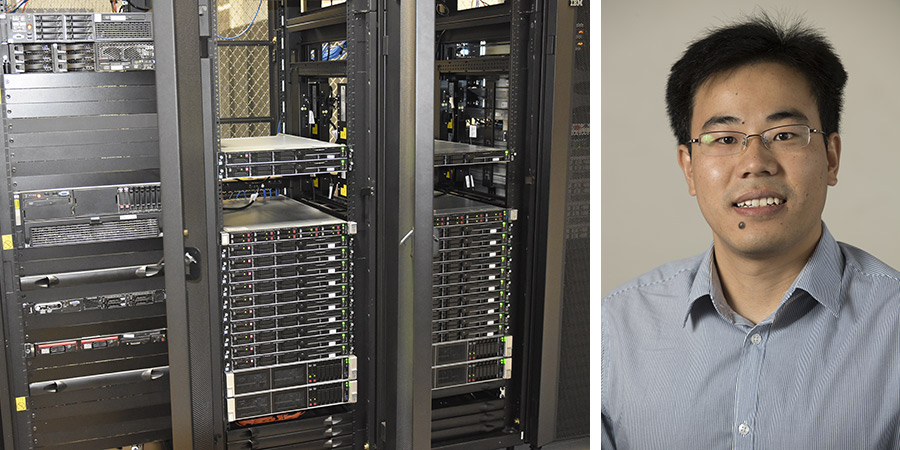NSF MRI Grant Increases High Performance Computing Capabilities on Campus

(The HPC data center, and principal investigator Hao Ji, assistant professor of computer science.)
We live in a world of big data made possible by advances in computer technology and the internet. The access to more data provides more opportunities for research but also creates more challenges. The primary challenge is the storage and management of large data sets. Speed is also a factor as research projects can take days or weeks to run on personal computers.
The solution is high performance computing (HPC). High performance computers are a necessary part of academic research and in 2017 Cal Poly Pomona built its first campus-wide HPC cluster. Funding was provided by lottery funds, the College of Science, and the Division of Information Technology & Institutional Planning (IT & IP). The HPC cluster has a top speed of 150 Teraflops which means it can perform 150 trillion floating-point operations per second. For comparison, Microsoft’s Xbox One X boasts six teraflops.
The current storage capacity of the university’s HPC is 16 terabytes (TB). A National Science Foundation MRI (major research instrumentation) grant will fund 100 additional TB of storage. Assistant Professor of computer science Hao Ji said, “We now have more tools to collect data so the size of that data is always increasing. This grant gives the campus the ability to work with big data.” Ji is the principal investigator (PI) on the grant.
“We’ll be conducting research into scalable algorithms for analyzing large data sets, deep learning, and three dimensional biological and medical image analysis.” Ji said. Deep learning is a type of machine learning that requires less human guidance because algorithms can assess the accuracy of a predicted outcome. Deep learning is the foundation of Artificial Intelligence.
The HPC will be a valuable resource for many disciplines at Cal Poly Pomona. The College of Business Administration will use it to analyze data extracted from social media. Hui Shi, assistant professor in computer information systems said, “Using social media data we’ve found that the total number of Facebook likes, links, and stories are positively associated with real estate sales; whereas the sentiment score of Facebook posts is negatively associated with real estate sales. Social media creates a large amount of data that requires the power of HPC and adequate storage.” Shi is Co-PI on the grant.
“The mass storage system will provide us with a solid base of knowledge and practical skills for developing scalable solutions to data intelligence challenges.” Ji said. “It will allow collaboration with other institutions and provide experience for CPP and K-12 students. There is an urgent need for data scientists and intelligence analysts. Cal Poly Pomona will be able to offer courses that tie high performance computing with machine learning and scalable algorithm design.”
The IT & IP Division has been an integral part of establishing the HPC on-campus and is working with the PI to purchase the mass storage equipment. IT & IP will also assist in implementing a user plan to advance research on campus.
